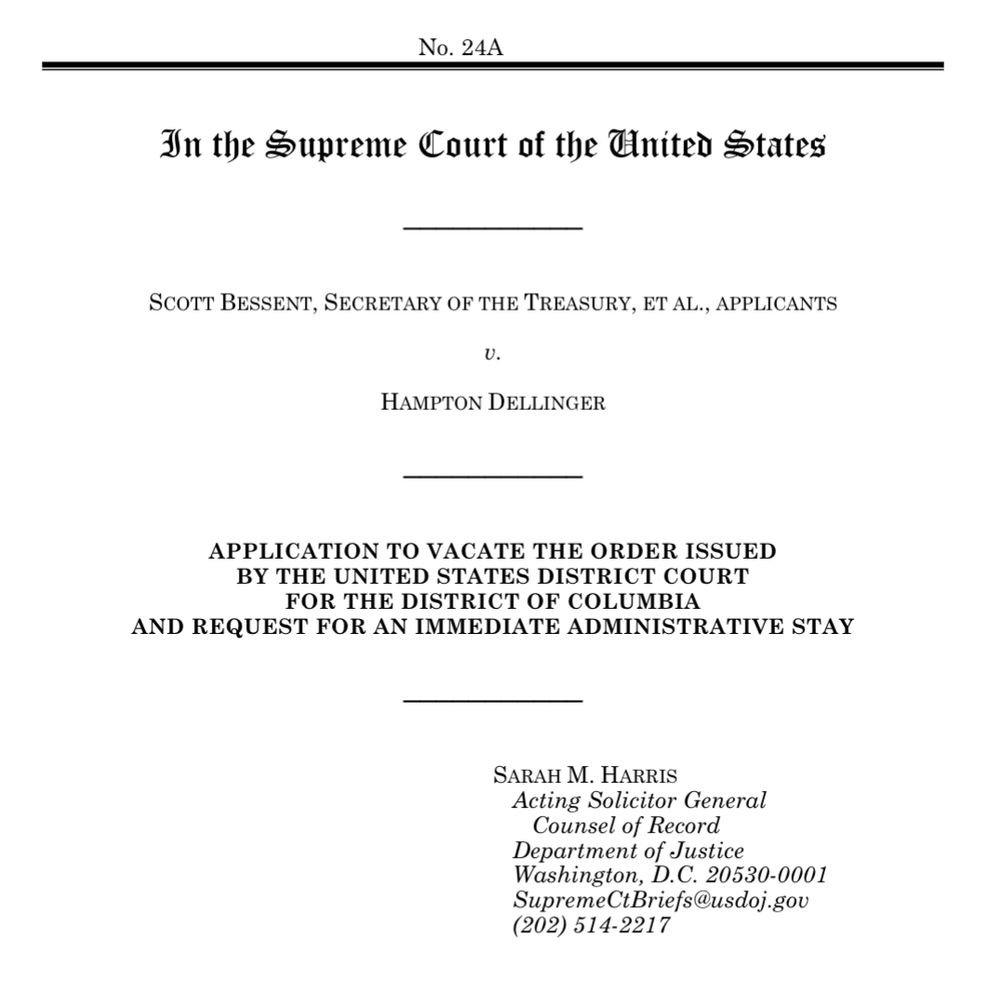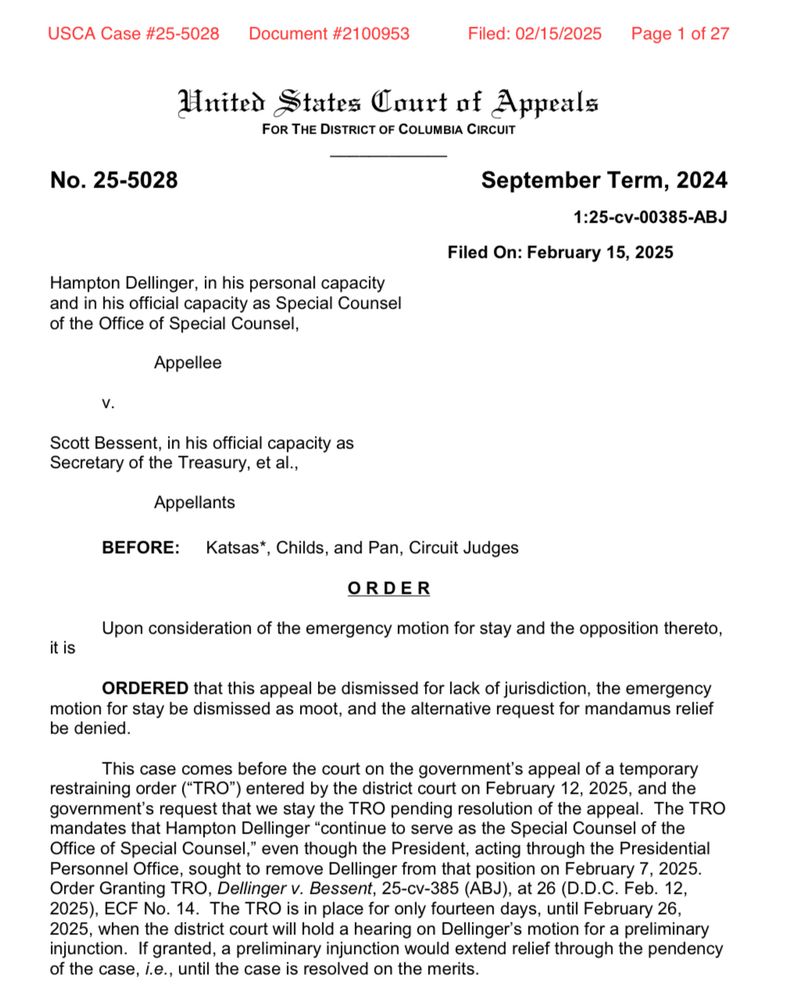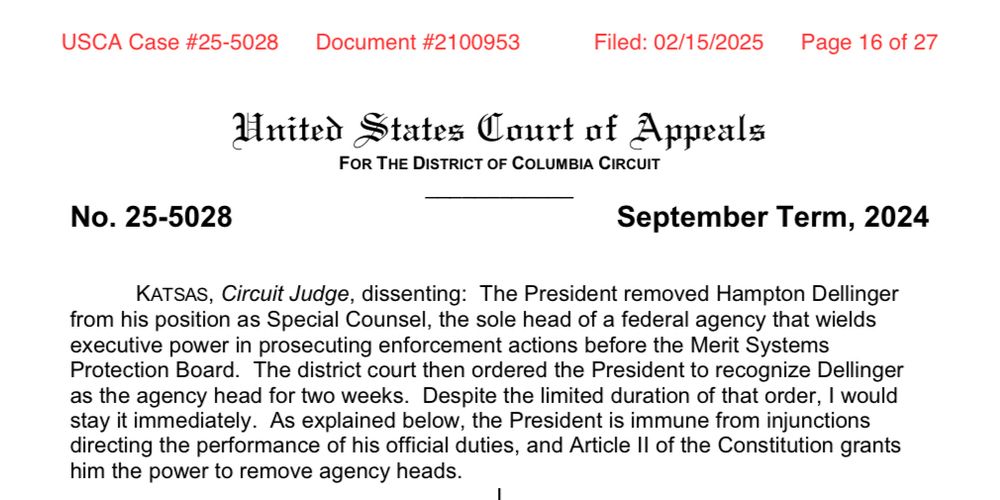Dellinger v. Bessent (1:25-cv-00385)
Court dockets
- Dellinger v. Bessent (1:25-cv-00385): initial complaint
- 25-5028: government appeals to DC circuit
- 24A790: government appeals to Supreme Court
Background
Hampton Dellinger was appointed Special Counsel of the US Office of Special Counsel by Joe Biden. He was sworn in on March 6, 2024.
Donald Trump fired him on February 7, 2025. The firing was in violation of the law, which provides that a special counsel can only be fired due to "inefficiency, neglect of duty, or malfeasance in office."
Dellinger launched a lawsuit to overturn the firing.
Result
Dellinger ultimately dropped his lawsuit, and accepted his dismissal.
News
- 2025-03-08 Former government watchdog on his decision to end legal fight challenging his firing (www.npr.org)
- 2025-02-17 Trump admin goes to SCOTUS to fight for right to fire protected agency head (www.lawdork.com)
SCOTUS waits
2025-02-21
BREAKING: SCOTUS, for now, leaves order in place keeping Special Counsel Hampton Dellinger in office. Trump fired him, but Dellinger sued.
The government’s request, however, is being kept before the court — on hold for now — since the TRO is set to expire on 2/26.
![Although it acknowledges that this Court typically does not have appellate jurisdiction over TROs, the Government urges us to construe the TRO as a preliminary injunction or to exercise jurisdiction under the All Writs Act in light of the core executive power assertedly restrained. Application 31-32; see 28 U.S. C. §1292(a)(1). In his opposition, Dellinger repeatedly notes that the TRO will "expire by its terms [in] eight [now five] days," Response in Opposition 1,
that it "lasts only for a very short duration," id., at 15, and that it "is set to expire on February 26," id., at 39.
In light of the foregoing, the application to vacate the order of the United States District Court for the District of Columbia presented to THE CHIEF JUSTICE and by him referred to the Court is held in abeyance until February 26, when the TRO is set to expire.](https://cdn.bsky.app/img/feed_thumbnail/plain/did:plc:36eqtmzysqf7wsslczw4uxcd/bafkreifyzwrmibipqn7sati4lkhiodl6j7ngyeyw4bkynt3es7skdpxfvy@jpeg)
Government appeals to SCOTUS
2025-02-16
NEW: DOJ goes to SCOTUS, calling the district court's temporary restraining order keeping the head of the U.S. Office of Special Counsel in his Senate-confirmed role for now "an unprecedented assault on the separation of powers" www.documentcloud.org/documents/25...

![This case involves an unprecedented assault on the separation of powers that
warrants immediate relief. As this Court observed just last Term, “Congress cannot
act on, and courts cannot examine, the President’s actions on subjects within his ‘con-
clusive and preclusive’ constitutional authority”—including “the President’s ‘unre-
stricted power of removal’ with respect to ‘executive officers of the United States
whom [the President] has appointed.’ ” Trump v. United States, 603 U.S. 593, 609
(2024) (citation omitted). As to such principal officers—“the most important of his
2
subordinates”—“[t]he President’s ‘management of the Executive Branch’ requires
him to have ‘unrestricted power to remove’ them ‘in their most important duties.’ ”
Id. at 621 (citation omitted). Enjoining the President and preventing him from exer-
cising these powers thus inflicts the gravest of injuries on the Executive Branch and
the separation of powers.](https://cdn.bsky.app/img/feed_thumbnail/plain/did:plc:36eqtmzysqf7wsslczw4uxcd/bafkreiedrt54mjhqujiqg4vtphhpjkgoihpsuzcw4ft3yv3zrvrvvms5ea@jpeg)
Government appeal denied
2025-02-15
Read the opinion.
DOJ made clear in its DC Circuit request that Acting Solicitor General Sarah Harris is likely to take this matter to SCOTUS — which would be wild given that Judge Amy Berman Jackson today agreed to merge the PI and merits review all to be considered still this month in the next two weeks.
BREAKING: On a 2-1 vote, the DC Circuit rejects the Trump administration’s request that Trump be allowed to immediately fire Hampton Dellinger, the head of the U.S. Office of Special Counsel. DOJ asked the appeals court to stay a TRO, which the majority notes would be a “sharp departure” from norms.



TRO granted
2025-02-13
Judge Amy Berman Jackson grants the TRO.
If you haven't been following this, here's the law — and here's what Trump did:
![The Office of the Special Counsel is led by the Special Counsel, 5 U.S.C. § 1211(a), who
is "appointed by the President, by and with the advice and consent of the Senate" to serve "for a
term of five years." Id. § 1211(b). Congress requires that the Special Counsel must "be an attorney
5
Filed 02/12/25
Case 1:25-cv-00385-ABJ Document 14 Filed 02/12/25 Page 6 of 27
who, by demonstrated ability, background, training, or experience, is especially qualified to carry out the functions of the position. Id. And, by statute, "[t]he Special Counsel may be removed by the President only for inefficiency, neglect of duty, or malfeasance in office." Id.](https://cdn.bsky.app/img/feed_thumbnail/plain/did:plc:36eqtmzysqf7wsslczw4uxcd/bafkreiea6a7umjxlgsnjwih4s7taxpl2hvxgiudgcx463hgblf3ooszh54@jpeg)
![B. Factual Background
On October 3, 2023, President Biden nominated Hampton Dellinger to be Special Counsel.
Compl. 430. The Senate confirmed Dellinger on February 27, 2024, and he was sworn into office on March 6, 2024. Compl. 9 30. His five-year term will expire in 2029. Compl. 9 30.
At 7:22 p.m. on Friday, February 7, 2025, Sergio N. Gor, identified in his email signature as "Assistant to the President, Director of Presidential Personnel Office" sent Dellinger an email that stated simply:
On behalf of President Donald J. Trump, I am writing to inform you that your position as Special Counsel of the US Office of Special Counsel is terminated, effective immediately."
Ex. A to Compl. [Dkt. # 1-1] ("Ex. A").](https://cdn.bsky.app/img/feed_thumbnail/plain/did:plc:36eqtmzysqf7wsslczw4uxcd/bafkreiez7wtvlft6jahwfs4t4muitpufccsixauodegqv4my63k4s7coma@jpeg)